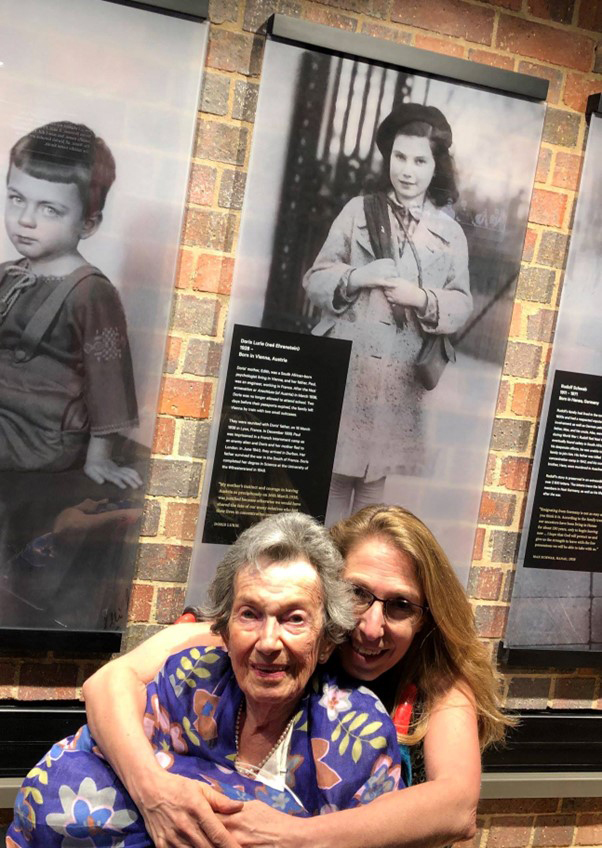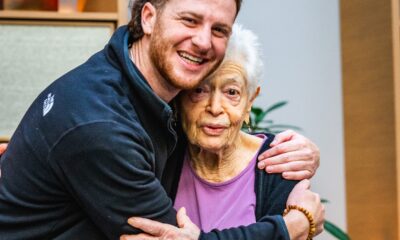
Tributes

A touch-and-go escape led to a life well lived
After three emigrations in less than two years, 12-year-old Doris “Dossy” Ehrenstein (who became Lurie) arrived in South Africa with her mother. They were destitute, but had managed to escape the true impact of the Holocaust in her birthplace, Austria.
Thereafter Doris never moved away from South Africa, which was the birthplace of her mother. Doris died in Johannesburg on 17 July at 94 after a long illness.
But she lived her life to the full, not least of all because she was so aware that her escape could so easily have ended differently.
When her mother made the snap decision to get the two of them out of Vienna in 1938, Doris was no longer allowed to attend school, Jewish-owned shops were attacked, and Jews were assaulted on the streets. It had even become dangerous for Jews to use public transport.
Doris’s mother, Edith, managed to obtain their passports, which were being held by a lawyer, only to find that she had two days before her passport expired.
So, the two left everything they couldn’t fit in two small bags and did their best to get to Paris, two days away, where Doris’s dad was working. They were robbed and harassed by Nazis en route, but somehow made it as far as Zurich. There, they had no choice but to contact Doris’s dad for money to get them to Lyon, where they joined him in March 1938.
Doris enrolled at a school there until September 1939, when war broke out and her father was arrested and interned as “an enemy alien”. At the time, there was much talk of women and children being arrested and sent to other camps. Doris’s mother tried everything she could to have her husband released, but to no avail, so they fled to safety.
They got to England on Friday, 13 December 1939, after crossing the Channel through a minefield. “We stood on the deck wearing cork lifebelts, ready to jump into the icy sea should the ship be blown up. We saw a mine right in the path of the ship. Just as we were going to collide, a destroyer came out of the thick fog and exploded the mine harmlessly,” Doris said.
They stayed in England with family until the school Doris went to was bombed in May 1940, and they were evacuated to the west of England. As her mother only had an Austrian passport, they weren’t allowed to stay in England long as she couldn’t earn an income.
Early in June, a charity organised them two one-way tickets to South Africa, where Doris’s mom had been born. Three weeks later, they arrived in Durban.
Again, they relied on family to survive in the beginning. “My mother, who was in a poor state of health due to all the stress and deprivation, had to go out to work – hard physical work – in order to support us,” said Doris.
Doris went to Parktown Convent, where she matriculated in 1944. In 1945, she began a degree in science at the University of the Witwatersrand on a municipal scholarship. She was one of very few women studying science at that time.
After graduating, she worked as a biochemist at the medical pathology laboratory at the then Johannesburg General Hospital.
She married Julian Lurie, a chemical engineer in 1953, and lived in Johannesburg, apart from four years in Durban.
They had three children: Peter (an architect then opera singer, now living in London after many years in Munich and New York City); Carol (a city planner and aviation sustainability expert living in Boston); and Roy (also a Boston resident, a qualified electrical engineer, working in the tech sector for a market-leading global corporation).
Her mother, Edith, died in 1969 in Johannesburg, and her father passed away near Carcassonne, France, in 1972.
After the death of her beloved husband, Doris got involved with the Johannesburg Holocaust & Genocide Centre, and was extremely active with her many creative interests, skills, and talents, which included painting, expert sewing projects for her own use, and beading.
Her children say the war influenced her life in that she was always interested in the effects it had had on her contemporaries and extended family. She maintained a long correspondence with her remaining family around the world including in Austria, France, Uruguay, Brazil, Israel, Czech Republic, Germany, the United States, and Canada.
She was an avid reader, and followed the family histories of contemporaries.
Most people remember Doris as “a very dignified lady, a creative multi-talent, a great listener, still making new friends until a few weeks before she passed away”, according to her children.











Elizabeth
July 29, 2022 at 2:59 pm
A truly remarkable life, and an heroic woman.